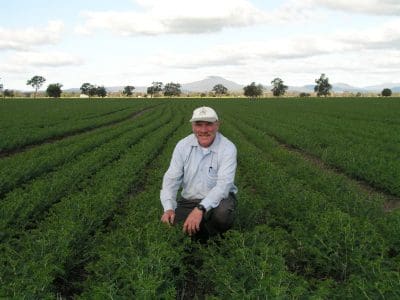CHICKPEA growers across Queensland and NSW need warm, dry weather from now on to reduce the disease risk and ensure “reasonable” yields in crops that have survived a wetter than average growing season.

NSW DPI senior plant pathologist Kevin Moore said wet, cool conditions during the growing season meant chickpea crops were now 3-6 weeks behind where they should be in terms of pod set and harvest, so most growers were still in disease management mode.
NSW Department of Primary Industries (DPI) senior plant pathologist Dr Kevin Moore said while there had been significant crop losses to waterlogging and flooding across the state, in northern regions many chickpea crops had staged a remarkable comeback in recent weeks.
“Surprisingly we have had numerous crops that we thought were gone, particularly in northern NSW and southern Queensland that are now looking harvestable,” he said.
“There are also cases of partial paddock losses, where growers are doing what they can to hold onto the remaining green crop, because of the high level of investment they have made.
“In general the wetter, cooler conditions during the growing season mean chickpea crops are now 3-6 weeks behind where they should be in terms of pod set and harvest, so most growers are still in disease management mode.”
Dr Moore said the high levels of Ascochyta blight, Sclerotinia and Botrytis grey mould (BGM) detected across chickpea crops throughout eastern Australia during winter and spring, were now in check as a result of drier, warmer conditions.
However, he warned this could change with a significant rain event, advising growers where possible to maintain fungicide regimes and apply sprays ahead of any wet weather.
“At the start of the season I advised growers and agronomists to have on-farm stores of Ascochyta and BGM sprays. Chlorothalonil and mancozeb fungicides are now in extremely short supply so in the case of another rain event the management options for many growers are limited and the best disease control measure would be dry, warm weather,” he said.
Meanwhile, Dr Moore urged those growers who had lost crops to waterlogging and flooding to be proactive in disease management and be cautious about summer crop choice amidst an elevated disease risk.
“Growers who have lost a chickpea crop need to be aware of the carry over disease risk of Sclerotinia,” he said.
“While Sclerotinia is not usually a major disease of chickpeas it has the potential to impact some summer crops including mungbeans, cotton, sunflowers and peanuts.”
He said for those wanting to reduce the potential yield impact from high disease levels post chickpeas, his recommended crop choices this season were sorghum and maize.
Looking further ahead to 2017, Dr Moore said it was critical growers planned winter crop rotations so chickpeas were not planted into paddocks that had grown chickpeas this season or in 2015.
He said planting chickpea-on-chickpea, especially after the high disease levels experienced this season would put current disease management practices under pressure and could lead to reduced life of chickpea varieties, development of fungicide resistance and problems with weeds and insects.
“Growers need to follow recommendations for current best practice with regard to crop rotation, especially after the challenges of the 2016 season.”
For more information, contact Dr Moore on 0488 251 866 or 02 6763 1100, fax 02 6763 1222 or email Kevin Moore or visit the GRDC-supported eXtension AUS website.
Source: GRDC

HAVE YOUR SAY